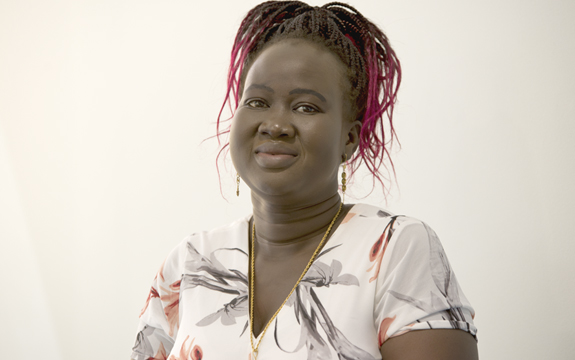Rebecca's journey to Swinburne

In Summary
- Written by Serena Seah, Susan Powell and Susan Bradley, Swinburne University of Technology. This edited article is republished from Finding Our Place.
Rebecca was born in Juba in South Sudan, one of the many children of her late father. He was married three times: his first wife had four children; his second, Rebecca’s mother, had six; and his third wife had one. Rebecca lost her mother at the age of three and was subsequently sent to her grandmother to be raised in her village. Like her younger sister, Rebecca doesn’t remember her mother, an enduring sadness. ‘I try, but I can’t remember her,’ she says.
Rebecca and her family belong to the Christian Dinka community, the largest ethnic tribe in South Sudan. Over the years, many thousands of both Dinkas and non-Dinkas in the South have been massacred by North Sudanese forces for their beliefs and way of life.
‘War came again in 1991, against the Dinkas in the south. The other side killed my grandmother and my father.’ Now orphaned, Rebecca was cared for from the age of ten by her aunt and uncle. She was still unaware of what had happened to some of her family members. ‘Three of my brothers were soldiers in the south and we had no contact with them. For years we didn’t know if they were dead or alive.’
Of that turbulent period Rebecca particularly remembers 1992. ‘It was a time of great hardship…I lost my father, and we were short of food. We lost our cattle and everything else. We couldn’t believe a couple of years later that we had survived. Things got a bit better then in various ways and connections were made with my siblings. We were able to sort out who had died and who was alive, and where they were. One brother was in Germany.’
Refuge in Kenya
In 1996 Rebecca and her two younger brothers left Sudan for neighbouring Kenya, in order to take refuge in a large camp in the town of Kakuma. The camp had been established for Sudanese people displaced by war or persecution. (In 2018 it contains over 185,000 refugees and asylum-seekers from many countries in Africa.)
Kakuma is characterised by dust storms, high temperatures, poisonous spiders, snakes, and outbreaks of malaria and cholera.
Rebecca lived in Kakuma for about ten years, she thinks – from her mid-teens to her mid-twenties. ‘In the camp, I went back to school in order to learn English, and we were also taught something about Australia.’
‘One of my achievements over this period was to help bring up my younger siblings and some of our cousins. One of the cousins is now in Canada and doing very well. I’m proud of the role I played in his life and others.’
‘In 1998, when I had been at Kakuma about two years, I told my brother that one day I would go to the West. He said no, but I kept it in my mind.’ Some years later, she approached UNHCR representatives about moving to Australia. ‘I had a lot of interviews with them and medical and other checks. If something was wrong they would not accept me. But they did, and I finally came here in 2005, with my partner, whom I had met in the camp.’
The move to Australia
Rebecca and her then-partner arrived in Melbourne to begin new and very different lives. They subsequently had five children here, the four oldest of whom are now at primary school.
Sadness followed her here when in 2013 her oldest brother died in the fighting in Sudan, leaving behind a family of several children. Rebecca named her youngest child after him and has tried without success to bring her brother’s family to Australia.
The reality
Given all that she had been through and the cultural differences to be negotiated, Rebecca says that 'I overall adapted fairly easily after I arrived in this country and now I am really settled.
‘Although I did have a terrible life, it’s OK now. I’m in Australia, I’ve got support everywhere and I have my children. I am the main influence in their lives and I’m pleased about that. And they have healthcare, education and freedom, which we don’t in Sudan.’
‘My children are also lucky that they were born here; they see themselves as Aussies. The generation who were not born here will be all right if they can get away from the past. But it’s very hard for teenagers especially, as they are fighting to find a place in two cultures. There are things they can’t know unless someone tells them, such as that it’s OK in Australia to look an older person in the eye. It’s the opposite in our culture. Someone has to tell them about this sort of thing and much else.’
Rebecca originally studied Migrant English at Swinburne some years ago and then did a childcare course with a private company. ‘I was OK in class,’ she says, ‘but I didn’t pass the work experience component because I had trouble with the language. So I went back to English classes at Swinburne in 2016 and 2017. I’m good at speaking and reading but writing is difficult.’
Swinburne has been important to her as not only a source of academic achievement but also personal support. ‘The teachers are very helpful. I believe what they tell me because they know what I need to improve, but they don’t push me beyond what I can cope with.’ She was given a laptop by the university, which she is very pleased about.
‘Education is the best thing, I tell my children. They see me working on my studies, and they study too. We are a team.’
Written by Serena Seah, Susan Powell and Susan Bradley, Swinburne University of Technology. This edited article is republished from Finding Our Place. Read the original article.

